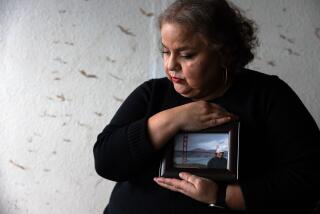Scrutiny of Tashfeen Malik’s fiancee visa fell short, congressional investigators say
- Share via
Reporting from Washington — Immigration officials failed to sufficiently scrutinize Tashfeen Malik’s petition to enter the U.S. to get married, allowing her in with an unverified assertion from her fiance and untranslated Arabic passport stamps as the only evidence that the couple had spent time together, congressional investigators said Friday.
The findings from an inquiry by the Republican-led House Judiciary Committee underscore the cursory nature of the vetting of the tens of thousands of people who enter the U.S. each year on the so-called fiancee visa. Malik, who died along with her husband in a police shootout after the Dec. 2 rampage that killed 14 people in San Bernardino, came into the U.S. in 2014.
One requirement for being granted entry under the program, officially known as the K-1 visa, is providing proof that the couple have met in person. During Malik’s vetting, an official requested a translation of Arabic writing on her passport stamps that would show that she and her then-fiance, Syed Rizwan Farook, were in Saudi Arabia at the same time in 2013, but there is no record that the translation was done, according to findings from committee Chairman Bob Goodlatte (R-Va.) that were provided to the Los Angeles Times.
Join the conversation on Facebook >>
Committee investigators had the passport stamps translated and found that Malik entered Saudi Arabia around June 4, 2013, and left later that year, but the date was illegible. Farook entered Saudi Arabia on Oct. 1, 2013, and left around Oct. 20 of that year, his passport showed. Malik had only a 60-day visa, making it unlikely the two were in the country together, according to Goodlatte, but Saudi officials have said their stay overlapped for about six days.
Her visa application, however, offered no additional proof they spent time together.
“It is clear that immigration officials did not thoroughly vet her application,” Goodlatte said in a statement Friday in which he slammed the processing of her application as “sloppily” done.
“What is worse, the immigration official reviewing Malik’s application requested more evidence to ensure the two met in person, but it was never provided and her visa was approved anyway,” said Goodlatte, who has reviewed the complete file.
The vetting was done by immigration officials at the Department of Homeland Security, which didn’t respond to requests for comment. Once the agency has approved the application, it is sent to the State Department to issue the visa.
The State Department sharply defended its work and said that Malik’s application was appropriately examined.
“All required procedures were followed in the K-1 visa case for Ms. Malik,” spokeswoman Elizabeth Kennedy Trudeau said in an interview. “There were no indications of any ill intent at the time that the visa was issued.”
But because of privacy laws and the ongoing FBI investigation into the massacre, she said she could not comment on whether Farook and Malik actually met before they sought the visa. She said the State Department had shared all its records on Malik with the FBI.
The circumstances surrounding Malik’s entry into the U.S. in 2014 have sparked heated debate about how deeply applicants should be scrutinized by State Department and immigration officials. Farook’s and Malik’s names were checked against U.S. criminal and counterterrorism databases during the screening process, but no negative information turned up, officials said.
Law enforcement officials have uncovered at least two private messages that Malik, a Pakistani woman who grew up in Saudi Arabia, wrote online to a small group of Pakistani friends in 2012 and 2014, pledging her support for Islamic jihad and saying she hoped to join the fight one day. But those messages were shielded from public view by privacy settings, officials said.
Immigration officials don’t regularly check the social media accounts of visa applicants. For years, senior officials at the Department of Homeland Security debated whether doing so would be too intrusive and violate principles of free speech and freedom of expression. In the past several months, the department has begun testing ways to include social media reviews in the vetting process. But searching the digital footprints left by applicants online is not a standard procedure for approving admission to the U.S.
In general terms, Trudeau said that “every visa case is unique, and the interview questions are tailored to the circumstances of each applicant. We use the information provided in the application, as well as information provided during the course of the interview, to devise a line of questioning.”
And she said that Department of State officials screen vigorously for possible terrorist ties. “We have a number of tools from which we draw this information,” such as matching fingerprints, conducting facial recognition tests and reviewing databases.
Follow @ByBrianBennett and @rickserranoLAT on Twitter.
MORE ON SAN BERNARDINO
Marquez and Farook plotted campus and freeway attacks, prosecutors allege
After San Bernardino massacre, suspect Enrique Marquez Jr. made dramatic 911 call
Gov. Brown declares state of emergency in San Bernardino; Obama set to meet families of victims
More to Read
Sign up for Essential California
The most important California stories and recommendations in your inbox every morning.
You may occasionally receive promotional content from the Los Angeles Times.














